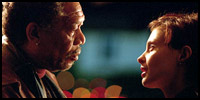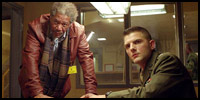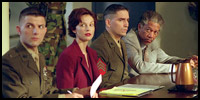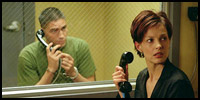
 |
High Crimes (2002) Directed by Carl Franklin Cast: Ashley Judd, Morgan Freeman, Jim Caviezel, Amanda Peet, Adam Scott, Juan Carlos Hernandez, Bruce Davison, Tom Bower, Michael Gaston, Jude Ciccolella, Emilio Rivera, Michael Shannon, John Billingsley, Dendrie Taylor, Paula Jai Parker 2002 – 115 minutes Rated: Reviewed by Dustin Putman, April 5, 2002.  Tell me if this sounds familiar. Claire Kubik (Ashley Judd) is a successful San Francisco-based attorney happily married to Tom (Jim Caviezel), until he is abruptly arrested by F.B.I. agents and sent to a military prison. Claire is horrified to find out that his name isn't really Tom, but Ron Chapman, and he is being accused of brutally murdering nine people in a Salvadoran village in 1988. Under the strict laws of the military, if he is proven guilty he will be sentenced to death. Tom/Ron is adamant that he has been set up, so the trusting Claire decides to represent him in the impending trial. Enlisting the help of recovering alcoholic Charlie Grimes (Morgan Freeman), who is said to be the best lawyer in town, Claire is determined to go up against the military court system and prove her husband's innocence.
Tell me if this sounds familiar. Claire Kubik (Ashley Judd) is a successful San Francisco-based attorney happily married to Tom (Jim Caviezel), until he is abruptly arrested by F.B.I. agents and sent to a military prison. Claire is horrified to find out that his name isn't really Tom, but Ron Chapman, and he is being accused of brutally murdering nine people in a Salvadoran village in 1988. Under the strict laws of the military, if he is proven guilty he will be sentenced to death. Tom/Ron is adamant that he has been set up, so the trusting Claire decides to represent him in the impending trial. Enlisting the help of recovering alcoholic Charlie Grimes (Morgan Freeman), who is said to be the best lawyer in town, Claire is determined to go up against the military court system and prove her husband's innocence.
 "High Crimes," uncreatively directed by Carl Franklin (1998's "One True Thing"), is a strictly paint-by-numbers courtroom thriller that would be utterly disposable if not for the talents of Ashley Judd (2001's "Someone Like You") and Morgan Freeman (2001's "Along Came a Spider"). They work hard at developing their characters beyond the cliched perimeters of the screenplay, written by Yuri Zeltser and Cary Bickley, but it is all for naught. The story is, indeed, so banal that even their finely tuned performances fail to bring light to the proceedings.
"High Crimes," uncreatively directed by Carl Franklin (1998's "One True Thing"), is a strictly paint-by-numbers courtroom thriller that would be utterly disposable if not for the talents of Ashley Judd (2001's "Someone Like You") and Morgan Freeman (2001's "Along Came a Spider"). They work hard at developing their characters beyond the cliched perimeters of the screenplay, written by Yuri Zeltser and Cary Bickley, but it is all for naught. The story is, indeed, so banal that even their finely tuned performances fail to bring light to the proceedings.
 Knowing that Zeltser has only been involved in direct-to-video fare until now, and Bickley's sole other screenwriting credit is for 1992's "The Gun in Betty Lou's Handbag" should give you an idea of how distinguished "High Crimes" is. It is one of those movies that spends a painstakingly long time setting up its participants and their plight (which, by the way, is tedious at best), only to pull the rug out from under everything we have already learned just to add a twist ending. As long as the ending zinger is based on tightly wound evidence, as it was in 1999's "The Sixth Sense," then more power to the filmmakers for fooling the audience. However, if it is done just for the sake of doing it and without any regard for the intelligence of its audience, as it is in "High Crimes," then it just makes you feel like a fool for wasting your time.
Knowing that Zeltser has only been involved in direct-to-video fare until now, and Bickley's sole other screenwriting credit is for 1992's "The Gun in Betty Lou's Handbag" should give you an idea of how distinguished "High Crimes" is. It is one of those movies that spends a painstakingly long time setting up its participants and their plight (which, by the way, is tedious at best), only to pull the rug out from under everything we have already learned just to add a twist ending. As long as the ending zinger is based on tightly wound evidence, as it was in 1999's "The Sixth Sense," then more power to the filmmakers for fooling the audience. However, if it is done just for the sake of doing it and without any regard for the intelligence of its audience, as it is in "High Crimes," then it just makes you feel like a fool for wasting your time.
Ashley Judd, so brilliant in her debut picture, 1993's "Ruby in Paradise," is treading the same water here as she was in 1999's "Double Jeopardy" and 1997's "Kiss the Girls," co-starring Freeman. Judd is usually a pretty smart businesswoman when it comes to choosing the roles she takes, and "High Crimes" is not going to stand as one of her finest hours. The same can be said for Morgan Freeman, in more or less the same part as he always play. Director Carl Franklin's idea of subtlety in portraying Freeman's character's alcoholism is by sharply focusing in on the liquor glass every time he picks it up.  Jim Caviezel, also a strong presence in 1998's "The Thin Red Line" and 2001's "Angel Eyes," has been stranded with a character who is more of a plot device than a human being. The film doesn't play fair with Tom/Ron, and there's only so much Caviezel can do with constantly being asked to look upset or sincere. In a remarkably one-note turn that could either be blamed on the actress or the writing, Amanda Peet (2000's "Saving Silverman") is simply annoying in the pointless part of Claire's daffy sister, Jackie. Peet looks like a fish out of water around the likes of Judd and Freeman.
Jim Caviezel, also a strong presence in 1998's "The Thin Red Line" and 2001's "Angel Eyes," has been stranded with a character who is more of a plot device than a human being. The film doesn't play fair with Tom/Ron, and there's only so much Caviezel can do with constantly being asked to look upset or sincere. In a remarkably one-note turn that could either be blamed on the actress or the writing, Amanda Peet (2000's "Saving Silverman") is simply annoying in the pointless part of Claire's daffy sister, Jackie. Peet looks like a fish out of water around the likes of Judd and Freeman.
An amalgamation of "A Few Good Men," "The General's Daughter" and, yes, Judd's own "Double Jeopardy," there is ultimately nothing offered in "High Crimes" that hasn't been done before, and better. The film is like a stale loaf of bread that you can easily recognize has far surpassed its expiration date. ©2002 by Dustin Putman |
 |













